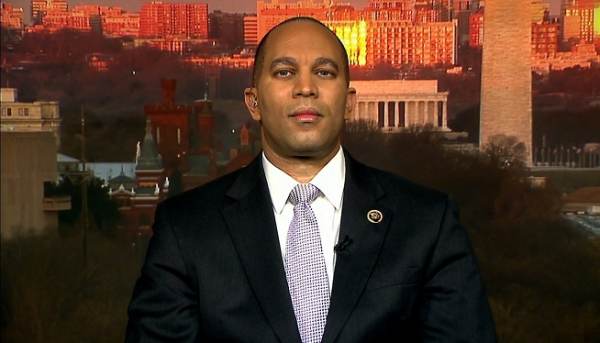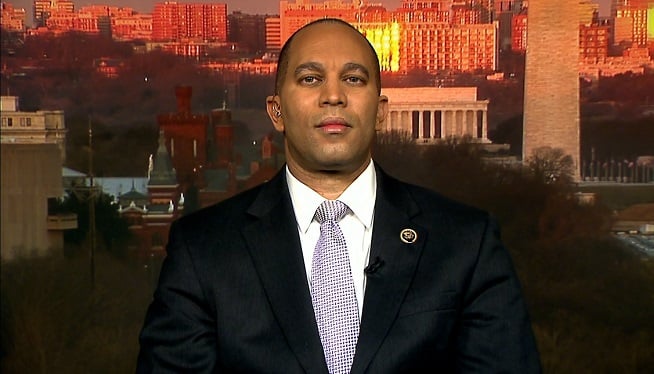
Representative Hakeem Jeffries
This article by Mark Paoletta first appeared in The Washington Examiner and is republished with permission.
LLast week, House Minority Leader Hakeem Jeffries (D-NY) attacked the Republican Party for removing Rep. Ilhan Omar (D-MN) from the House Foreign Affairs Committee for his blatantly anti-Semitic comments. But before attacking Republicans on this issue, Jeffries needs to own up to his past support for a notorious antisemite and why he lied about this past support when he was a newly elected member of Congress.
As a college senior on the executive committee of the Black Student Union at Binghamton University, Jeffries vigorously defended a notorious antisemite, his uncle, Professor Leonard Jeffries, who spread hatred, racism, and bigotry.
After Hakeem Jeffries was elected to Congress, he was dishonest about his earlier support for his uncle’s hateful comments. Nor does it appear that he ever repudiated the support of his uncle’s views.
Running: Moving forward – The state of New California sends representatives to Washington DC
Ilhan Omar thinks you are really dumb
In an infamous July 1991 speech, Leonard Jeffries claimed that “a conspiracy, planned and orchestrated and programmed out of Hollywood, where people known as Greenberg and Weisberg … created a system of destruction for black people.” Professor Jeffries also claimed that “wealthy Jews” financed the slave trade. Professor Jeffries also said in a classroom that “Jews are dogs.” According to one report, Professor Jeffries “teaches his controversial hypothesis that African Americans are warm, humanistic ‘sun people’ and European Americans are cold, materialistic ‘ice men.’ People of African descent, Jeffries states, have ‘core spiritual values’ that people of European descent lack.”
In an August 1991 article by Kenneth Stern reviewing Professor Jeffries’ record, Stern wrote, “Dr. Jeffries preaches anti-Semitism like a religion,” and notes that Jeffries’ July 1991 speech “shows[d] Anti-Semitism is central to his teachings.
This racist and anti-Semitic speech followed shortly after a 1991 speech that drew national attention and eventually led to his dismissal by the City College of New York, Binghamton University’s Black Student Union. invited Professor Jeffries will address the University in February 1992. In response to the uproar that followed, BSU’s board, including Hakeem Jeffries, held a press conference on campus to defend his invitation and “deny Jeffries’ accusations that they are anti-Semitic..“We have no intention of rejecting a presentation that contains factual information, substantiated by scholarly documents and texts,” Hakeem Jeffries said. Also the Black Student Union appreciated Professor Jeffries as a “renowned historian” and “well-known intellectual”.
According to a news report, Leonard Jeffries’ speech in Binghamton “once again laid the blame for the disdain of blacks in film … on ‘anti-black’ Jewish movie moguls … and reiterated his claim that ‘rich Jews’ had played an important role. African The slave trade.”
Leonard Jeffries’ anti-Semitism continued well after his speech in Binghamton. In 1994, the Assistant Press Professor Jeffries is quoted as saying that “Jews were ‘skunks’ and ‘stuck everything.’ When asked about his comments, Professor Jeffries said that he “doesn’t remember,” adding, “Is there no freedom of speech in America?”
In 2012, the Anti-Defamation League quoted Jeffries as saying that year, “The evil genius of the Jewish community was to combine their power to turn business into their religion and make it part of their culture.”
A number of university leaders have criticized Professor Jeffries in African American studies. Harvard University professor Henry Louis Gates called him “The Edge”. City College professor Michelle Wallace said, “Leonard Jeffries is not rational. It is not possible to absorb the ‘Sun Man’ and the ‘Ice Man’ in a logical way. My view of Leonard Jeffries is that he is a lunatic.”
When Hakeem Jeffries was elected to Congress in 2012, he tried to erase his uncle’s support for the hateful teachings from history. A 2013 Hakeem Jeffries profile The Wall Street JournalJeffries dodged questions about his uncle’s views, claiming, according to the reporter, that he “disagrees[d] with many of his [uncle’s] theory,” although he did not specify which. In this same interview, Hakeem Jeffries claimed that until 2013, he had “not seen his uncle’s controversial speeches.” It seems almost impossible to square with his statement at a 1992 press conference that Professor Jeffries’ view ” substantiated by factual information, scholarly documents and texts” and specifically rejecting his uncle’s accusation is heretical.
Jeffries’ dissension on the subject spilled over into a 2013 interview. For example, he claims that he had a “vague memory” of the controversy surrounding his uncle, and that his mother “made a very deliberate, concerted effort to shield us from a lot of the controversy.” Regarding the controversy surrounding Jeffries’ 1991 speech, Hakeem Jeffries claimed, “My brother and I were apart at school. There was no Internet in that era, and I can’t recall a single daily newspaper in the Binghamton, New York, area that didn’t cover things that The New York Post And daily news It was then.”
Not true. Hakeem Jeffries literally invited Professor Jeffries to speak to the newspaper shortly after his infamous July 1991 speech and then held a press conference to deny the allegations against Professor Jeffries. Local newspapers in Binghamton also covered his uncle’s controversy before Hakeem Jeffries and his Black Student Union colleagues invited him to speak.
Now that he is the leader of the House Democrats, it is time for Congressman Jeffries to level with the public where he stood in 1992, why he tried to paper over his past support of anti-Semitism, where he stands now, and to condemn Professor Jeffries in particular. Semitic perspective.
Mark Paoletta is a partner at Schaerr Jaffe and a senior fellow at the Center for Renewing America. He most recently served as general counsel for the Office of Management and Budget in the Trump administration and, prior to that, counsel to Vice President Mike Pence.

